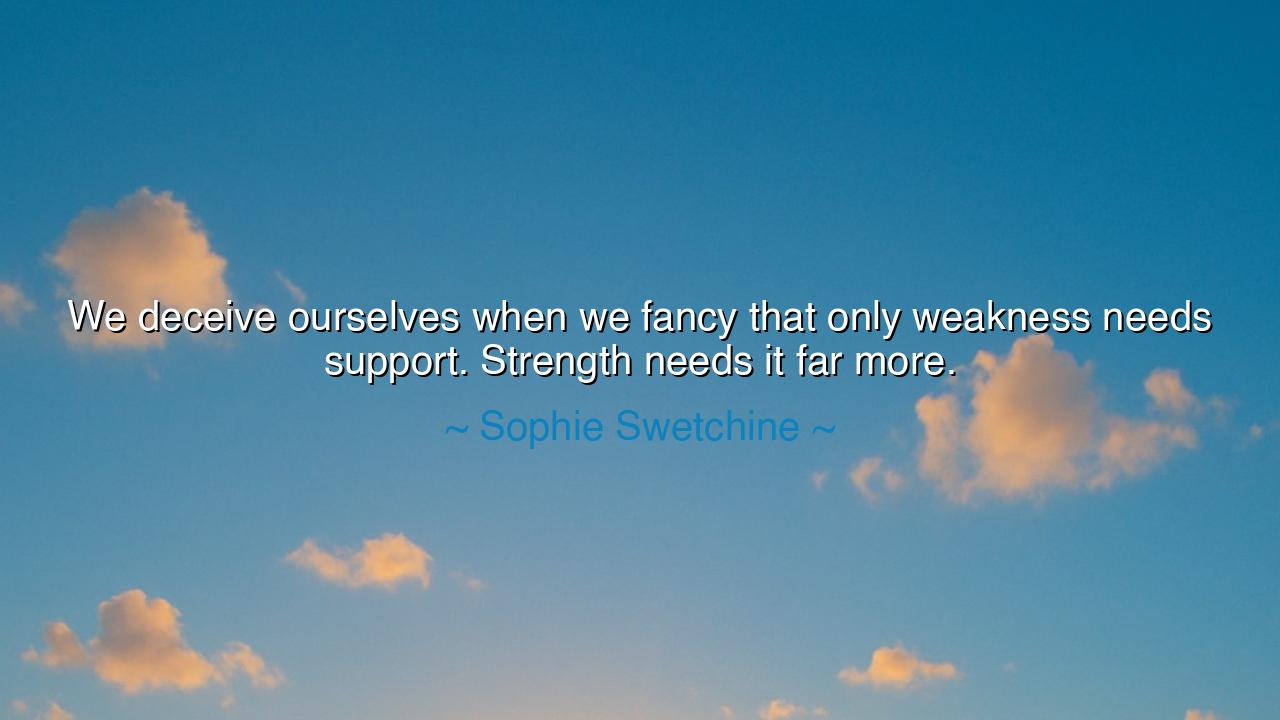
We deceive ourselves when we fancy that only weakness needs
We deceive ourselves when we fancy that only weakness needs support. Strength needs it far more.






Hear now the voice of Sophie Swetchine, the Russian mystic of the nineteenth century, who, through contemplation of the soul, gave forth this wisdom: “We deceive ourselves when we fancy that only weakness needs support. Strength needs it far more.” These words, subtle yet thunderous, pierce the illusions of pride. For men often imagine that the strong are self-sufficient, that those who carry heavy burdens do so without faltering. But Swetchine reminds us that it is not the frail alone who need a hand—it is often the mighty who require the greater support.
Consider the meaning of weakness. The weak do not hide their need; their cries are audible, their wounds visible, their dependence open for all to see. Thus, help flows to them, for compassion is easily stirred by those who stumble. But strength is hidden, and those who bear it are often silent. Their faces show resolve, their backs hold steady under weight, and the world assumes they require nothing. Yet the very weight of their labor, the very solitude of their burden, means they are in greater danger of exhaustion. In their silence, their need is deeper.
Think of Abraham Lincoln in the midst of the American Civil War. To his people, he seemed the tower of resolve, the unbreakable guide of a fractured nation. Yet history tells us he battled deep sorrow, sleepless nights, and a loneliness heavier than the war itself. His strength sustained a nation, but he often leaned upon the counsel of trusted allies, the quiet support of his faith, and the letters of those who believed in him. Without such pillars, even his towering will might have crumbled. Here we see Swetchine’s truth embodied: the stronger the man, the more support he requires to sustain his mighty labor.
The ancients, too, understood this. Even Hercules, strongest of mortals, could not fulfill his labors alone. He leaned on the wisdom of Athena, the guidance of others, and the mercy of those who forgave his faults. His strength was not diminished by such dependence; it was magnified, for the greatest power lies not in isolation, but in the bonds that uphold us when the load becomes unbearable.
What, then, is the error Swetchine warns against? It is the folly of assuming the strong need nothing, and the folly of the strong themselves believing they must ask for nothing. Pride deceives both the giver and the bearer. In truth, the noblest souls must learn the humility to receive aid, and the wise must learn to offer it even to those who seem unshakable. For just as a mighty oak requires deep roots and the support of the soil, so too does human strength depend upon unseen supports.
The lesson for us is clear: do not withhold your hand from the strong, imagining they are secure. Look closely at those who seem unbreakable, for often they suffer in silence. And if you yourself are counted among the strong, do not despise support. Accept it with gratitude, for in leaning upon others, you give them the sacred honor of sharing in your burden. Strength is not diminished by dependence—it is deepened, broadened, made enduring.
Practical actions are these: offer encouragement not only to the weak, but to the leaders, the caregivers, the pillars in your life. Ask them how they fare, and listen deeply. Give your presence as support, even when they do not ask. And when you are weary, have the courage to speak, to invite others into your struggle, and to rest in the strength of community. For in this mutual bearing of burdens, both weakness and strength find renewal.
Thus Swetchine’s words resound through time: strength needs support far more than weakness. Let us not be deceived by appearances, nor by pride. Instead, let us build a world where the strong and the weak alike uphold one another, so that no soul collapses alone beneath the weight it carries. For it is in supporting strength that civilizations endure, and in admitting our need that true greatness is revealed.






AAdministratorAdministrator
Welcome, honored guests. Please leave a comment, we will respond soon